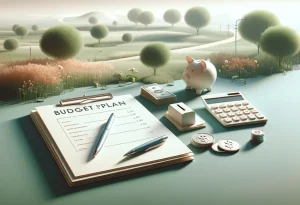Let’s face it, life has a knack for throwing us financial curveballs when we least expect them. Between surging expenses and the elusive dream of a beefy savings account, scraping by becomes second nature for too many of us. In this blog post, we’re diving deep into the art of frugality — not as a compromise, but as a smart, proactive approach to taking control of your financial future.
By the end, you’ll walk away with a toolkit of strategies designed to not only bolster your savings but also to transform the way you think about spending, saving, and living well on less.
Quick Takeaways:
- Plan your meals and shop generics to halve your grocery bill.
- Compare car costs with public transport fares to find your budget-friendly commute.
- Adopt DIY skills for repairs and embrace minimalism for less stress and more savings.
What Can You Do Today to Cut Your Grocery Bill in Half?
Grocery shopping can take a big chunk out of your budget, but with a few tweaks to your routine, you can slash your bill significantly. First thing’s first: meal planning is your new best friend. Planning your meals for the week not only saves you money but also time and food waste. Stick to your list, folks! It’s easy to get sidetracked by those tempting sale signs, but if it’s not on your list, it’s not in your cart.
Smart shopping techniques can be a game changer. Opt for generic brands over name brands – the quality is often comparable but at a fraction of the cost. Also, consider shopping at discount or bulk stores where you can get more bang for your buck.
Coupons and discounts are not relics of the past. Websites such as Coupons.com or apps like Ibotta offer digital coupons that can be easily applied. Here’s a unique tip: Some stores have specific days where discounts are deeper or offer additional savings on clearance items. Getting familiar with your store’s schedule can lead to unexpected bargains.
Is Ditching Your Car for Public Transport Worth the Savings?
When it comes to saving money, reevaluating your transportation needs can lead to huge savings. Owning a car is undeniably convenient but comes with its hefty price tag – think insurance, maintenance, gas, and parking fees. On the other hand, public transport is not only more affordable but also kinder to the environment.
However, what’s right for someone might not be for you. Calculate your monthly car expenses, and compare them to the cost of a monthly public transport pass. Don’t forget to consider other factors such as time and convenience. For some, a combination of public transport and ride-sharing or biking can be the golden middle way, offering both savings and flexibility.
An often-overlooked alternative is carpooling. Websites like CarpoolWorld connect people traveling in the same direction. By sharing the ride, you’re slicing your expenses and making a new friend or two.
Can You Really Save Money by Going Digital With Your Subscriptions?
In today’s digital age, physical subscriptions can often seem a bit quaint. Why pile up paper when you can have everything at your fingertips? Switching to digital subscriptions can not only tidy up your living space but also save you a pretty penny.
Start by auditing your current subscriptions. Do you really read that magazine, or is it gathering dust? Many publications offer digital subscriptions at a lower cost, and oftentimes, you can access more content than in the print versions.
Here’s a little-known tip: Some libraries offer free access to digital magazines, newspapers, and even services like Lynda.com through platforms like OverDrive or Libby. All you need is a library card, which is free. This is a fantastic way to enjoy a wide range of subscriptions without opening your wallet.
By embracing these strategies, you’re not just cutting costs; you’re adopting a more sustainable and mindful way of living. Remember, frugal living doesn’t mean skimping on quality of life; it’s about making smarter choices that benefit your bank account and your wellbeing. Stay tuned for more essential frugal living strategies that will help you boost your savings without sacrificing the things you love.
How do DIY skills contribute to frugal living?
When it comes to tightening those purse strings, what if I told you that embracing your inner handyman, gardener, or beauty guru could not only enrich your life but also plump up your savings? Yep, rolling up your sleeves and diving into the world of DIY can be one of the most fulfilling and financially savvy moves you can make.
Start Small, Save Big
The journey into DIY doesn’t have to start with rebuilding a car engine or knitting an entire wardrobe. In fact, beginning with manageable projects is the key to success. Consider minor household repairs you’ve been putting off because you thought they were out of your league. With a plethora of YouTube tutorials, online forums like Reddit’s DIY community, and free resources from your local library or community center, learning these skills is more accessible than ever.
- Leaky Faucet? There’s a tutorial for that.
- Hemming Pants? Grab a needle and thread, and you’re halfway there.
- Basic Gardening? Start with something simple like herb gardening which can also cut down on grocery bills.
Remember, the internet is your oyster, with experts and hobbyists alike sharing their knowledge freely.
The Unique Tip:
One unique piece of advice, often overlooked, is learning to make your own cleaning products. Not only is it eco-friendly and better for your health, but it’s also incredibly cost-effective. Ingredients like vinegar, baking soda, and essential oils can be used in various combinations to tackle almost any household cleaning task, from windows to tiled floors. A quick search can yield a multitude of recipes, and you’ll be amazed at how much you can save by ditching those pricey, chemical-laden products.
What are the unseen benefits of embracing minimalism?
Now, let’s tackle a concept that’s been gaining momentum but is often misunderstood: minimalism. No, it doesn’t mean getting rid of all comforts and living in a spartan abode. Rather, it’s about making more room—physically, mentally, and financially—for the things that truly matter to you.
Less is More: Financial and Psychological Perks
At first glance, the financial benefits of minimalism seem obvious. Less spending on material goods equals more money in the bank. But the perks run deeper than that. Embracing a minimalist lifestyle can lead to:
- Lower Stress Levels: Clutter isn’t just a physical nuisance; it’s a mental one too. A decluttered space can lead to a decluttered mind, reducing anxiety and boosting productivity.
- Increased Savings: By being more intentional with your purchases, you inherently spend less and save more. This extra padding in your savings account can afford you the freedom to pursue experiences and opportunities you might have had to pass up otherwise.
- A Richer Life: Here’s the kicker – a minimalist approach often leads to a richer life experience. When you value experiences over possessions, you open up new avenues for joy and fulfillment that don’t come with a price tag.
Challenge Yourself
To truly embrace minimalism, challenge yourself to a monthly “purchase pause.” For one month, commit to buying only essentials. This doesn’t mean you have to live off-grid and forsake all worldly possessions. Instead, it’s about taking a moment to assess what you truly need versus what you want. You might find that experiences, such as a night laughing with friends or a peaceful hike, hold more value than any item you could purchase.
Wrap-Up
Incorporating DIY skills into your life and embracing a minimalist mindset doesn’t just benefit your wallet; they enrich your life in a multitude of ways. They encourage you to be more self-reliant, reduce waste, and focus on what genuinely brings happiness. So, why not give it a whirl? You might be surprised at how liberating it feels to fix your own leaky faucet or find joy in the simple pleasure of a decluttered space. Remember, frugal living isn’t about “going without” – it’s about making smart decisions that pave the way for a richer, more fulfilling life.
As a financial advisor, my goal is to guide you through the world of personal finance with clear, practical advice. With a dedication to clarity and your financial well-being, I’m here to provide insightful guidance and support as you build a foundation of wealth and security.







